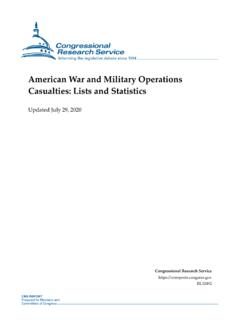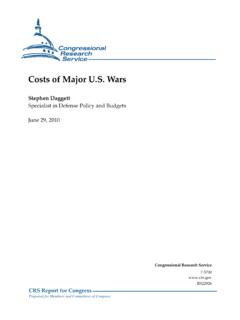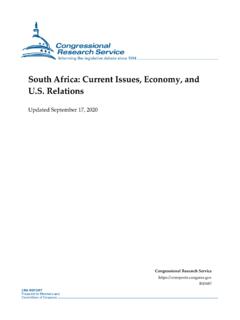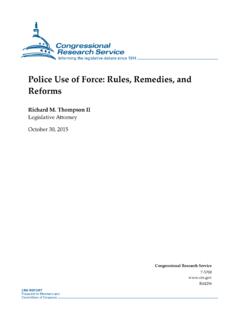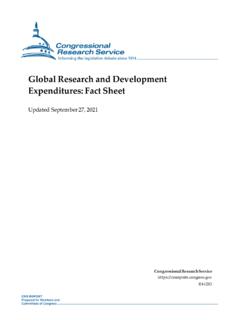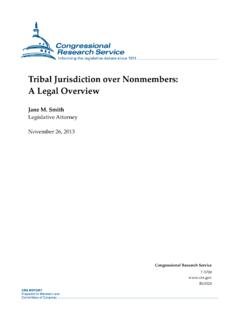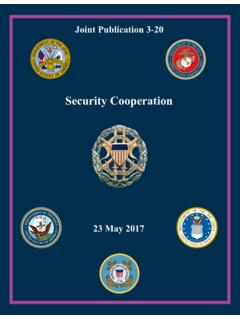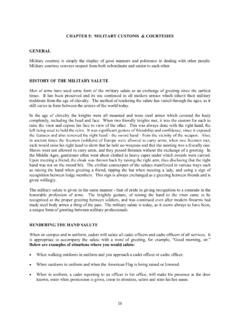Transcription of Updated November 10, 2020 - Federation of American …
1 Artificial Intelligence and National security Updated November 10, 2020 Congressional Research Service R45178 Artificial Intelligence and National security Congressional Research Service Summary Artificial intelligence (AI) is a rapidly growing field of technology with potentially significant implications for national security . As such, the United States and other nations are developing AI applications for a range of military functions. AI research is underway in the fields of intelligence collection and analysis, logistics, cyber operations, information operations, command and control, and in a variety of semiautonomous and autonomous vehicles. Already, AI has been incorporated into military operations in Iraq and Syria.
2 Congressional action has the potential to shape the technology s development further, with budgetary and legislative decisions influencing the growth of military applications as well as the pace of their adoption. AI technologies present unique challenges for military integration, particularly because the bulk of AI development is happening in the commercial sector. Although AI is not unique in this regard, the defense acquisition process may need to be adapted for acquiring emerging technologies like AI. In addition, many commercial AI applications must undergo significant modification prior to being functional for the military . A number of cultural issues also challenge AI acquisition, as some commercial AI companies are averse to partnering with the Department of Defense (DOD) due to ethical concerns, and even within the department, there can be resistance to incorporating AI technology into existing weapons systems and processes.
3 Potential international rivals in the AI market are creating pressure for the United States to compete for innovative military AI applications. China is a leading competitor in this regard, releasing a plan in 2017 to capture the global lead in AI development by 2030. Currently, China is primarily focused on using AI to make faster and more well-informed decisions, as well as on developing a variety of autonomous military vehicles. Russia is also active in military AI development, with a primary focus on robotics. Although AI has the potential to impart a number of advantages in the military context, it may also introduce distinct challenges. AI technology could, for example, facilitate autonomous operations, lead to more informed military decisionmaking, and increase the speed and scale of military action.
4 However, it may also be unpredictable or vulnerable to unique forms of manipulation. As a result of these factors, analysts hold a broad range of opinions on how influential AI will be in future combat operations. While a small number of analysts believe that the technology will have minimal impact, most believe that AI will have at least an evolutionary if not revolutionary effect. military AI development presents a number of potential issues for Congress: What is the right balance of commercial and government funding for AI development? How might Congress influence defense acquisition reform initiatives that facilitate military AI development? What changes, if any, are necessary in Congress and DOD to implement effective oversight of AI development?
5 How should the United States balance research and development related to artificial intelligence and autonomous systems with ethical considerations? What legislative or regulatory changes are necessary for the integration of military AI applications? What measures can Congress take to help manage the AI competition globally? Artificial Intelligence and National security Congressional Research Service Contents Introduction .. 1 AI Terminology and Background .. 1 Issues for Congress .. 5 AI Applications for Defense .. 9 Intelligence, Surveillance, and Reconnaissance .. 10 Logistics .. 11 Cyberspace Operations .. 11 Information Operations and Deep Fakes .. 12 Command and Control.
6 12 Semiautonomous and Autonomous Vehicles .. 13 Lethal Autonomous Weapon Systems (LAWS) .. 15 military AI Integration Challenges .. 16 Technology .. 17 Process .. 17 Personnel .. 19 Culture .. 19 International Competitors .. 20 China .. 21 Russia .. 25 International Institutions .. 27 AI Opportunities and Challenges .. 27 Autonomy .. 28 Speed and Endurance .. 29 Scaling .. 29 Information Superiority .. 29 Predictability .. 30 Explainability .. 32 Exploitation .. 34 AI s Potential Impact on Combat .. 35 Minimal Impact on Combat .. 35 Evolutionary Impact on Combat .. 36 Revolutionary Impact on Combat .. 37 Figures Figure 1. Relationships of Selected AI Definitions .. 4 Figure 2.
7 Chinese Investment in AI Companies, 2010-2017 .. 23 Figure 3. Value of Autonomy to DOD Missions .. 28 Figure 4. AI and Image Classifying Errors .. 31 Figure 5. AI and Context .. 31 Figure 6. Adversarial Images .. 34 Artificial Intelligence and National security Congressional Research Service Tables Table 1. Taxonomy of Historical AI Definitions .. 3 Contacts Author Information .. 39 Acknowledgments .. 39 Artificial Intelligence and National security Congressional Research Service 1 Introduction1 Artificial intelligence (AI) is a rapidly growing field of technology that is capturing the attention of commercial investors, defense intellectuals, policymakers, and international competitors alike, as evidenced by a number of recent initiatives.
8 On July 20, 2017, the Chinese government released a strategy detailing its plan to take the lead in AI by 2030. Less than two months later Vladimir Putin publicly announced Russia s intent to pursue AI technologies, stating, [W]hoever becomes the leader in this field will rule the world. 2 Similarly, the National Defense Strategy, released in January 2018, identified artificial intelligence as one of the key technologies that will ensure [the United States] will be able to fight and win the wars of the future. 3 The military is already integrating AI systems into combat via a spearhead initiative called Project Maven, which has used AI algorithms to identify insurgent targets in Iraq and These dynamics raise several questions that have been addressed in congressional hearings: What types of military AI applications are possible, and what limits, if any, should be imposed?
9 What unique advantages and vulnerabilities come with employing AI for defense? How will AI change warfare, and what influence will it have on the military balance with competitors? Congress has a number of oversight, budgetary, and legislative tools available that it may use to influence the answers to these questions and shape the future development of AI technology. AI Terminology and Background5 Almost all academic studies in artificial intelligence acknowledge that no commonly accepted definition of AI exists, in part because of the diverse approaches to research in the field. Likewise, although Section 238 of the FY2019 National Defense Authorization Act (NDAA) directs the Secretary of Defense to produce a definition of artificial intelligence by August 13, 2019, no official government definition of AI yet The FY2019 NDAA does, however, provide a definition of AI for the purposes of Section 238: 1.
10 Any artificial system that performs tasks under varying and unpredictable circumstances without significant human oversight, or that can learn from experience and improve performance when exposed to data sets. 2. An artificial system developed in computer software, physical hardware, or other context that solves tasks requiring human-like perception, cognition, planning, learning, communication, or physical action. 1 This report was originally written by Daniel S. Hoadley, Air Force Fellow. It has been Updated by Kelley M. Sayler, Analyst in Advanced Technology and Global security . 2 China State Council, A Next Generation Artificial Intelligence Development Plan, July 20, 2017, translated by New America, , and Tom Simonite, For Superpowers, Artificial Intelligence Fuels New Global Arms Race, Wired, August 8, 2017, 3 Department of Defense, Summary of the 2018 National Defense Strategy, , 4 Marcus Weisgerber, The Pentagon s New Algorithmic Warfare Cell Gets Its First Mission: Hunt ISIS, Defense One, May 14, 2017, 5 For a general overview of AI, see CRS In Focus IF10608, Overview of Artificial Intelligence, by Laurie A.
